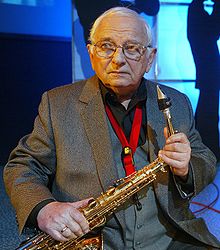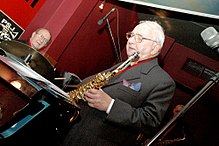| Revision as of 14:19, 3 August 2021 editGerda Arendt (talk | contribs)Autopatrolled, Extended confirmed users, File movers, Pending changes reviewers, Rollbackers382,431 editsm →Life and career← Previous edit | Latest revision as of 19:41, 8 October 2024 edit undoInternetArchiveBot (talk | contribs)Bots, Pending changes reviewers5,388,187 edits Rescuing 1 sources and tagging 0 as dead.) #IABot (v2.0.9.5 | ||
| (15 intermediate revisions by 14 users not shown) | |||
| Line 1: | Line 1: | ||
| {{Short description|Polish jazz musician and composer}} | {{Short description|Polish jazz musician and composer (1928–2021)}} | ||
| {{Use dmy dates|date= |
{{Use dmy dates|date=August 2021}} | ||
| {{Infobox person | {{Infobox person | ||
| | name = Jerzy Matuszkiewicz | | name = Jerzy Matuszkiewicz | ||
| Line 7: | Line 7: | ||
| | caption = Matuszkiewicz in 2006 | | caption = Matuszkiewicz in 2006 | ||
| | birth_date = {{birth date|1928|04|10|df=y}} | | birth_date = {{birth date|1928|04|10|df=y}} | ||
| | birth_place = ], |
| birth_place = ], Poland | ||
| | death_date = {{death date and age|2021|07|31|1928|04|10|df=y}} | | death_date = {{death date and age|2021|07|31|1928|04|10|df=y}} | ||
| | death_place = Warsaw, Poland | | death_place = Warsaw, Poland | ||
| Line 24: | Line 24: | ||
| }} | }} | ||
| '''Jerzy " |
'''Jerzy''' "'''Duduś'''" '''Matuszkiewicz''' ({{IPA|pl|ˈjɛʐɨ matuʂˈkʲɛvit͡ʂ}}; 10 April 1928 – 31 July 2021) was a Polish ] musician and composer, playing saxophone, clarinet and piano. Between 1950 and 1958, he was leader of the jazz group ]. From 1965, he focused on composing music for films. He was a pioneer of the post-World War II jazz movement in Poland, regarded as a "Founding Father" of Polish jazz.<ref name="Culture" /> | ||
| == Life and career == | == Life and career == | ||
| Matuszkiewicz was born in ] and began playing jazz as a youth. He founded a jazz club at the ] in ] at age 20,<ref name="Polandin" /> and played with the orchestra of Kazimierz Turewicz.<ref name="Gradowski" /> | Matuszkiewicz was born in ] and began playing jazz as a youth. He founded a jazz club at the ] in ] at age 20,<ref name="Polandin" /> and played with the orchestra of Kazimierz Turewicz.<ref name="Gradowski" /> | ||
| A club ] ( |
A club ] (music enthusiasts) was founded in 1947 at the ] YMCA, a hang-out of nonconformist thinkers during the late 1940s.<ref name="Culture" /> Musicians of the first years included Marek Szczerbiński-Sart, trumpeter {{ill|Andrzej Wojciechowski (musician)|pl|Andrzej Wojciechowski (muzyk)|lt=Andrzej "Idon" Wojciechowski}}, drummer ], and Marian and {{ill|Tadeusz Suchocki|pl}}.<ref name="Gradowski" /> Matuszkiewicz came to Łódź to study at the new ]. He came to the club and joined the sessions. After only a few concerts, the YMCA was closed because the organisation was criticised for "debauching the youth and promoting imperialistic ideology using jazz music" at the end of the year.<ref name="Gradowski" /> | ||
| ] in 1957]] | |||
| Matuzkiewicz founded and led a band in 1950, playing saxophones and clarinet with the former players and additionally pianist ] and bassist Witold Kujawski.<ref name="Gradowski" /><ref name="Henry" /> Polish musicians were separated from developments of Western jazz,<ref name="Culture" /> because the Stalinist regime considered jazz music as part of decadent American culture.<ref name="Polandin" /> They had no recordings and publications, therefore they played a repertoire that did not compare to Western standards. Critic Elliott Simon noted: | |||
| {{quote|Melomani played a series of standards with enthusiasm exceeded only by their fans' obvious adoration ... it is however, the historical circumstance - when Jazz was a high energy outlet for the creativity of a culturally repressed society."<ref name="Culture" />}} | |||
| ⚫ | The band was offered space to practise at the Film School, and during the first year, performed informal concerts at the Film School, in bars and afor private events, around once a week. When they received an invitation to play a concert in Warsaw at the Academy of Fine Arts, they named themselves Melomani. In 1952, pianist ], who had connections and made more concerts beyond Łódź possible, joined the band. They played at the first jazz festival in ] in 1956. On 1 January 1958, they were the first Polish jazz band invited to perform at the ] in Warsaw. The group disbanded that year.<ref name="Gradowski" /> | ||
| ⚫ | ] | ||
| ⚫ | The band was offered space to practise at the Film School, and during the first year, performed informal concerts at the Film School, in bars and afor private events, around once a week. When they received an invitation to play a concert in Warsaw at the Academy of Fine Arts, they named themselves Melomani. In 1952, pianist ] |
||
| ⚫ | ] | ||
| Until 1964, Matuszkiewicz performed both in Poland and abroad. In 1965, he began to mainly compose and conduct music for movies and commercials.<ref name="Polandin" /><ref name="Filmpolski" /> He later resided |
Until 1964, Matuszkiewicz performed both in Poland and abroad. In 1965, he began to mainly compose and conduct music for movies and commercials.<ref name="Polandin" /><ref name="Filmpolski" /> He later resided with his wife, Grażyna, in Warsaw, where he died, aged 93.<ref name="Polandin" /><ref name="Gazeta" /> | ||
| == Awards == | == Awards == | ||
| Line 98: | Line 102: | ||
| | website = polandin.com | | website = polandin.com | ||
| | access-date = 2 August 2021 | | access-date = 2 August 2021 | ||
| | archive-date = 2 August 2021 | |||
| | archive-url = https://web.archive.org/web/20210802114209/https://polandin.com/55144931/polish-jazz-pioneer-passes-away-aged-93 | |||
| | url-status = dead | |||
| }}</ref> | }}</ref> | ||
| Line 116: | Line 123: | ||
| ] | ] | ||
| ] | ] | ||
| ⚫ | ] | ||
| ] | ] | ||
| ] | ] | ||
| ⚫ | ] | ||
| ] | |||
Latest revision as of 19:41, 8 October 2024
Polish jazz musician and composer (1928–2021)
| Jerzy Matuszkiewicz | |
|---|---|
 Matuszkiewicz in 2006 Matuszkiewicz in 2006 | |
| Born | (1928-04-10)10 April 1928 Jasło, Poland |
| Died | 31 July 2021(2021-07-31) (aged 93) Warsaw, Poland |
| Education | Łódź Film School |
| Occupations |
|
| Organizations | Melomani |
| Awards | |
Jerzy "Duduś" Matuszkiewicz (Polish pronunciation: [ˈjɛʐɨ matuʂˈkʲɛvit͡ʂ]; 10 April 1928 – 31 July 2021) was a Polish jazz musician and composer, playing saxophone, clarinet and piano. Between 1950 and 1958, he was leader of the jazz group Melomani. From 1965, he focused on composing music for films. He was a pioneer of the post-World War II jazz movement in Poland, regarded as a "Founding Father" of Polish jazz.
Life and career
Matuszkiewicz was born in Jasło and began playing jazz as a youth. He founded a jazz club at the YMCA in Kraków at age 20, and played with the orchestra of Kazimierz Turewicz.
A club Melomani (music enthusiasts) was founded in 1947 at the Łódź YMCA, a hang-out of nonconformist thinkers during the late 1940s. Musicians of the first years included Marek Szczerbiński-Sart, trumpeter Andrzej "Idon" Wojciechowski [pl], drummer Witold "Dentox" Sobociński, and Marian and Tadeusz Suchocki [pl]. Matuszkiewicz came to Łódź to study at the new Łódź Film School. He came to the club and joined the sessions. After only a few concerts, the YMCA was closed because the organisation was criticised for "debauching the youth and promoting imperialistic ideology using jazz music" at the end of the year.

Matuzkiewicz founded and led a band in 1950, playing saxophones and clarinet with the former players and additionally pianist Andrzej Trzaskowski and bassist Witold Kujawski. Polish musicians were separated from developments of Western jazz, because the Stalinist regime considered jazz music as part of decadent American culture. They had no recordings and publications, therefore they played a repertoire that did not compare to Western standards. Critic Elliott Simon noted:
Melomani played a series of standards with enthusiasm exceeded only by their fans' obvious adoration ... it is however, the historical circumstance - when Jazz was a high energy outlet for the creativity of a culturally repressed society."
The band was offered space to practise at the Film School, and during the first year, performed informal concerts at the Film School, in bars and afor private events, around once a week. When they received an invitation to play a concert in Warsaw at the Academy of Fine Arts, they named themselves Melomani. In 1952, pianist Krzysztof Komeda, who had connections and made more concerts beyond Łódź possible, joined the band. They played at the first jazz festival in Sopot in 1956. On 1 January 1958, they were the first Polish jazz band invited to perform at the National Philharmonic in Warsaw. The group disbanded that year.

Until 1964, Matuszkiewicz performed both in Poland and abroad. In 1965, he began to mainly compose and conduct music for movies and commercials. He later resided with his wife, Grażyna, in Warsaw, where he died, aged 93.
Awards
Matuszkiewicz received the Commander's Cross of the Order of Polonia Restituta for outstanding achievements. In 2006, he was awarded the Gold Helikon medal from the Krakow Jazz Club. In 2021, he received an award for his life achievements at the Polish Film Awards gala.
References
- ^ "Polish Jazz – Freedom at Last / The Story of Polish Jazz". culture.pl. 19 January 2009. Retrieved 3 August 2021.
- ^ "Polish jazz pioneer passes away aged 93". polandin.com. 31 July 2021. Archived from the original on 2 August 2021. Retrieved 2 August 2021.
- ^ Gradowski, Mariusz (December 2011). "Melomani". culture.pl. Retrieved 3 August 2021.
- Henry, Clarence Bernard (August 2021). Global Jazz: A Research and Information Guide. Routledge. p. 206. ISBN 978-1-00-043099-8.
- "Jerzy Matuszkiewicz". filmpolski.pl (in Polish). Retrieved 3 August 2021.
- "Jerzy "Duduś" Matuszkiewicz nie żyje. Legendarny jazzman i kompozytor miał 93 lata". kultura.gazeta.pl (in Polish). 31 July 2021. Retrieved 3 August 2021.
Further reading
- Dabrowski, Jaroslaw: Jazz in Communist Poland: Jerzy Matuszkiewicz and Melomani (thesis), York University, Toronto, 2006
- Johnson, Bruce: Everyday Life in Jazz and Totalitarianism, Taylor & Francis, 2016, ISBN 978-1-31-749943-5 pp. 105–111
External links
- Jerzy Matuszkiewicz discography at Discogs
- Jerzy Matuszkiewicz at IMDb
- Kałużna, Ewa: Jerzy "Duduś" Matuszkiewicz (in Polish, biography, photos and videos) muzeumjazzu.pl 2020